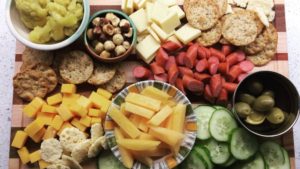Not your grandma’s pickles: New generation embraces preserving on P.E.I.
Fermenting and canning are hot trends in the kitchen this fall
By Sara Fraser, CBC News

‘A snack board I put together — top left corner is pickled curry cauliflower and lower centre is pickled rutabaga, all lacto-fermented,’ says P.E.I.’s Laura Hogan. (Submitted by Laura Hogan)
There’s a new wave of home preservers on P.E.I. and they’re creating food, drinks and snacks their grandmothers have likely never heard of.
- Canning is cool again: Food blogger offers tips for making the most out of your garden haul
- A more probiotic pyramid. Researcher wants fermented foods added to Canada Food Guide
Lacto-fermentation is a particularly popular practice among this generation of homemakers — it’s natural fermentation, without any vinegar or cultures, that can be done simply in salt water on a countertop. Once the desired level of fermentation is reached, it goes in the fridge.
“I don’t think kombucha was something our grandmothers were making!” laughs Laura Hogan of Charlottetown, who started fermenting last year.
She’s been fermenting fruits and vegetables she purchases through a local weekly veggie-box delivery including rhubarb, beets and rutabagas. She makes what she calls “tasty snacks,” and describes their flavour as “wild,” “sour,” and “funky.” (Funky is a good thing, she says.)
Contain probiotics
“They also contain probiotics, so that’s kind of why I wanted to include these pickled things in my diet. Probiotics are more beneficial than we ever used to think.”
- Why fermented food should be on your list for daily meals
- D is for Dinner: a recipe for lacto-fermented sauerkraut
Danielle White, who has a large garden on her rural property in Hampton, P.E.I., believes canning and preserving are making a comeback because people want to know what they’re eating — trying to buy local and reduce preservatives in their food.
“They may have done a little bit of it as kids, but I think primarily they’re trying it out because they saw it online,” says White, 38.
‘It turned out being good for my mental health, as well.’— Danielle White
The previous generation, she believes, rejected pickling and canning as drudgery — but their children’s interest in it has been revived.
“I’m also a knitter and a sewer and a weaver, and it’s the same thing for all of those crafts — there’s been sort of a resurgence because for my cohort, my generation, it was never a necessity, you don’t have to do it — it’s fun. It wasn’t rammed down anyone’s throat their whole childhood.”
White still makes old-fashioned pickled beets and dilled carrots, but also zucchini relish, pickled fennel, kombucha (a fermented sweet tea that’s very popular) and lots of jams from berries she’s picked herself.
“Now you can walk into any bookstore and there’s a whole section on fermentation,” she says. “People are a little more experimental because a.) they’re seeing these things in the grocery store and b.) they’re finding the books that explain to them how to do it.”
Knowing where her food comes from helps White reduce waste — she’s more careful, knowing what it took to grow it — and has also refined her palate, she says.
“It started out being a fun, nostalgic thing, and it was also a money-saver — and it turned out being good for my mental health, as well,” she says.
White used to work full time in an architectural firm as a project manager and interior designer, but scaled back to three or four days a week so she could enjoy her pastimes including canning.
Hogan, 35, a family doctor, says she has most weekends free to indulge her passion in the kitchen.
Health benefits
“Cooking and food preparation are my big hobbies,” she says. She urges people to try it for the health benefits.
“It might not be for everyone but I certainly would say give it a shot. Try a friend’s home-made sauerkraut, just a few bites and see what you think of it.”
For Charlottetown’s Aimee Power, 31, the trend is all about fermenting her own beverages and sodas from scratch.
“Making cocktails is fun!” she enthuses.
“I live in a small house, and I know these things are quickly and easily consumable,” she says, adding it’s “compact and easy.”
‘I couldn’t get it, so I called my nanny.’— Annie MacEachern
Power heard about fermenting from friends, and joined the PEI Fermentation Society on Facebook — a group that’s holding fermentation parties this fall and sharing recipes, advice and bacteria cultures.
“It’s not a lot of work,” she says, but you do have to be patient while foods ferment — anywhere from a couple of days to a couple of weeks.
‘Fermentation frenzy’
Annie MacEachern calls the current trend “a fermentation frenzy.” She saw friends posting their pickling pics on social media and tried it out, using a YouTube video as a guide.
“But I couldn’t get it, so I called my nanny,” MacEachern says. “She agreed to teach me how to make pickles just like she does.”
Her grandmother, Bette Campbell, even purchased all the supplies, and the two made bread-and-butter pickles and mustard pickles.
MacEachern now cherishes the hand-written recipes her grandmother gave her, and has since attempted to make pickles on her own but says they’ve never turned out quite as good.
- MORE P.E.I. NEWS | ‘Good time, hot day’: P.E.I. athlete with autism runs in Chicago Marathon
- MORE P.E.I. NEWS | New Chinese-English school planned for P.E.I.

